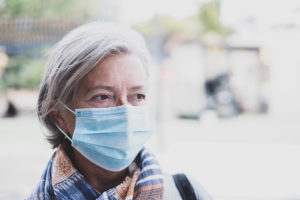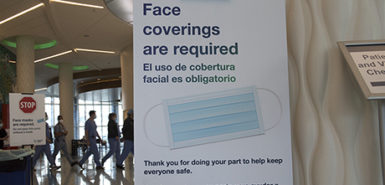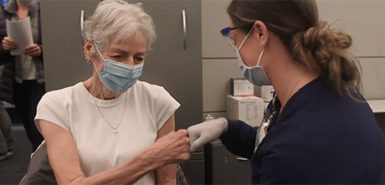
If you have heart disease, you have extra reason to protect yourself against COVID-19.
“People with heart disease are at much higher risk for complications from COVID-19, as they are with every respiratory virus,” said Thomas Boyden, MD, a Spectrum Health preventive cardiologist.
The risks posed by the new coronavirus still exist, even as the government allows more public gatherings and the opening of stores and restaurants.
“While those things are coming back to normal, we are still going to see a continuing influence of the coronavirus in our society for a long time,” Dr. Boyden said.
Although it’s a respiratory disease, COVID-19 affects organs throughout the body, especially the heart. The infected lungs send less oxygen to the bloodstream, which deprives the heart of oxygen.
Also, the chemicals released by the immune system to fight the infection can cause an irregular heartbeat or damage to muscle tissue of the heart, which can lead to heart failure.
“All these things are really, really important,” Dr. Boyden said. “This is not to scare people. But this is why they need to understand how cautious they should be.”
Reduce risks
Dr. Boyden urges those with heart disease to practice social distancing—wear a face mask and keep 6 feet from others, particularly in indoor spaces.
“You can enjoy each other’s company, but don’t do it too closely,” he said.
Although face masks primarily help prevent someone with the virus from spreading it to others, they can still provide protection for the wearer, he said. They minimize the chance the virus will reach the mucus membranes in the nose and mouth.
He encourages everyone to continue wearing face masks, not just those with heart disease, to reduce the spread of the virus throughout the community.
“Research suggests that up to 80% of the people who have COVID-19 are unaware they have the virus,” he said. “This is why the virus can be easily spread if we don’t take the necessary precautions.”
If you become ill
If you have heart disease—and suspect you have COVID-19—contact your doctor so you can get tested, Dr. Boyden said.
The virus causes flu-like symptoms. The most common are fever, coughing, fatigue and shortness of breath. Some people experience more subtle symptoms, such as chills, muscle pain, nausea and vomiting.
“We are seeing that if we start treatment for people early, they tend to do better,” he said. “If they are further into the infection and have complications, then it becomes much more difficult.”
Take your heart medicines
Dr. Boyden encourages heart patients to keep a good supply of prescription medicines on hand. Use delivery or curbside services for medications to reduce your risk of exposure.
Although concerns were raised about some blood pressure medicines and COVID-19, heart specialists recommend that patients continue to take these medications, he said.
A recent study in the New England Journal of Medicine examined four kinds of medications for hypertension. It found they did not raise the risk of COVID-19 infections or increase the risk of a more severe illness.
Seek emergency care when needed
If you have the symptoms of a heart attack, seek immediate medical attention, Dr. Boyden said.
Doctors have seen some patients delay emergency care because they fear exposure to the coronavirus—but that can have life-threatening consequences.
“With heart attacks, we say time is muscle,” he said. “The longer you wait to treat a heart attack, the more heart muscle you are going to lose and the more likely you are to develop problems like heart failure.”
If a patient seeks medical attention promptly, heart specialists are better able to remove the clot from a blood vessel and minimize the lack of oxygen to the heart.
He assured patients Spectrum Health has taken steps to reduce exposure risks to the coronavirus, including extensive cleaning, isolating COVID-19 patients, and screening employees and patients.
Healthy lifestyles
Remember to take care of your heart with healthy lifestyle choices, Dr. Boyden added.
Cut out processed, high-fat, high-carbohydrate foods and processed meats. Eat more fruits and vegetables.
“Eat things growing right out of the farms here in Michigan,” Dr. Boyden said. “That’s one of the best ways to reduce your risk.”
And keep exercising. Studies have shown a 30-minute walk each day can cut your risk of a cardiovascular event by 30%.
“The more physically fit you are, the more likely you are to do well if you contract a virus, whether it’s COVID-19 or anything else,” he said.
“I can’t stress enough the concept of a healthy lifestyle. You can do more to promote and maintain your health than medications and medical procedures. It’s not to say that those things aren’t important, but health starts with the decisions we make at home every day.”

 /a>
/a>
 /a>
/a>
 /a>
/a>